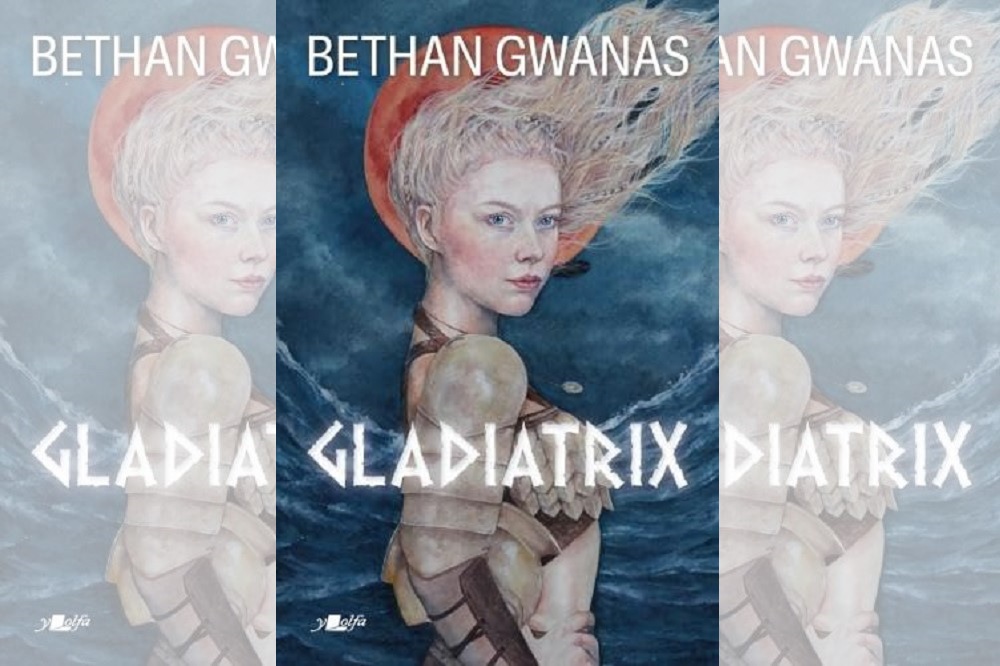Book review: Gladiatrix by Bethan Gwanas

Myfanwy Alexander
The latest stonker of a Welsh language novel by Bethan Gwanas is pitched for young adults, so I had the pleasure of realizing that I am over half a century over the target audience.
However, it didn’t feel as if that target excluded anyone, any more than the gloriously well-defined female protagonist makes it a book unsuitable for male readers.
‘Gladiatrix’ is a book so rich, so exciting and so absorbing that your own demographic characteristics will be the last thing on your mind as you race through the pages.
Recently, there was something of a social media frenzy around the TikTok research which revealed how surprisingly often the average man thinks about the Roman Empire. This was rather disturbing to me as I certainly have ‘male-pattern Roman thinking.’
But you do not have to have the remotest interest in Ancient History to relish this book which takes on Robert Graves and Robert Harris on their own territory and knocks them right out of the Colosseum.
‘Gladiatrix’ is a compelling story, taking the reader into an exotic but highly believable world peopled by characters of genuine depth which makes the reader care deeply about their fate.
Impressive backdrop
This book was obviously the product of comprehensive research, which is obvious from the way the knowledge is deftly deployed. Gwanas knows her stuff but she also knows that you have not picked up this book for a history lesson.
The factual background to the book remains a remarkable and impressive backdrop to the story, like the mountains of Eryri painted on the sky above Ynys Môn.
The way in which life on pre-Roman Môn is captured is masterful. The reader is thrown right into the midst of a community facing an existential crisis and whilst never slowing the pace, Gwanas almost surreptitiously tells us what life was like for the inhabitants: poignantly, we see what is lost just before it is destroyed.
As acknowledged in her afterword, sources describing this period of Welsh history are fragmentary and, of course, are victors’ accounts of triumphs over ‘barbarians.’
There is a tendency for all conquered people to idealize life before their suppression: my father’s oft-repeated phrase: ‘We had no windows till the Romans came but neither did we know sorrow so it was a poor bargain’ is typical of this form of sentimentality which Gwanas deftly avoids.
The heroine Rhiannon and her family live lives which are full of challenge and hard work, yet they have freedoms within a cosmology which delivers them a psychologically strengthening structure.
Druids
Which brings me to the druids. It’s hard to get druids right. On the one hand, we are presented with the howling masters of human sacrifice the Romans were forced to subdue because of their overall beastliness.
In this context, it is important to remember the syncretic nature of Roman religion: they no sooner saw a native cult than they absorbed it into their own practice. The two most notable exceptions to this process were the God of the Israelites and Druidism.
For the practices of the Druids to be crushed not absorbed, it was essential for them to be viewed as bloodthirsty fiends.
On the other hand, the shallow tropes of modern paganism depict Druids as Liberal Democrats in mistletoe crowns, worthy priests of the goddess Gaia, representing a pre-lapsarian harmony between man and nature with not a sacrificed goat in sight.
Gwanas avoids both of these polarities and builds a coherent world view which informs the inner life of her characters. When the Romans cross the strait to crush the Druids, the reader has already come to appreciate this world, preparing them to mourn its loss.
This novel contains the best Druids since Getafix mixed his magic potion for Obelix.
Compelling
Rhiannon is taken from her home in the wake of this catastrophe and moves into the heart of the Roman world.
Her bafflement is a brilliant way for the reader to grapple with new concepts whilst avoiding info-dumping or confusion: as Rhiannon travels towards understanding, the readers are her companions.
And it is a compelling world she moves through, peopled by vivid characters which never tip into cliché.
In the current political climate, an enslaved heroine might have triggered worthy disquisitions on the evils of slavery but Gwanas never preaches: she shows not tells the horror which comes from lack of freedom.
Female gladiator
In this review, I have deliberately avoided outlining the plot because the book moves at such a pace that any spoiler would be a crime.
Suffice it to say that Rhiannon journeys from Ynys Môn to Rome and beyond, becoming a female gladiator and Russell Crowe is probably eating his heart out at this very moment as his portrayal of life in the arena of death is eclipsed: Maximus is no longer my favourite sword and sandal protagonist.
This is a cracking read, making me wish this story could be filmed but in the meantime, ‘Bethan Gwanas, those who are about to die salute you.’
Gladiatrix by Bethan Gwanas is published by Y Lolfa and is available from all good bookshops.
Support our Nation today
For the price of a cup of coffee a month you can help us create an independent, not-for-profit, national news service for the people of Wales, by the people of Wales.







